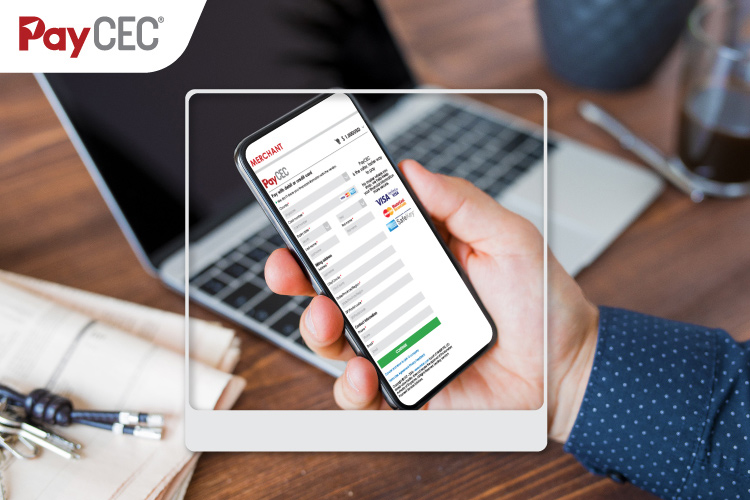- Hotline +65 6631 8332
What is an electronic payment gateway?
Friday, 10 Sep, 2021

This article is a part of PayCEC payment insights
Follow PayCEC - global payment gateway to get updates on the latest payment trends and ecommerce news
What's inside?
In recent years, e-commerce has become a critical component of the global retail structure. Since the birth of the internet, the retail scene, like many others, has experienced major changes, and thanks to the ongoing digitalization of modern life, consumers from practically every country today benefit from the advantages of online purchases.
Payment gateway and merchant accounts service providers have risen in popularity as a result of the Internet's rapid expansion, in order to meet the demands of customers. There are types of electronic payments. They're in charge of a payment's security and sensitive transaction data, as well as processing it into a virtual station or an E-commerce website.
So, what is an electronic payment gateway?

There are types of electronic payment.
1. What is an electronic payment gateway?
Payment gateways are increasingly important to businesses, as evidenced by the recent surge in online payments. Payment gateways are services that enable a business to accept credit/ debit card payments, bank transfer and cryptocurrencies. They benefit the organization by providing secure and seamless transactions and reducing the risk of lost payments. A payment gateway is a system that allows your customers to send you money. Payment gateways are similar to the point-of-sale terminals that are found in most physical stores. Customers and businesses must collaborate to execute a transaction when using a payment gateway.
1.1 Key takeaways of electronic payment gateway ?
- Payment gateways are interfaces that collect payment information from customers.
- Payment gateways are point-of-sale (POS) terminals that gather credit/debit card, bank transfer and cryptocurrency information through card or smartphone in physical stores.
- Payment gateways are the "checkout" interfaces for online stores that allow customers to enter credit/debit card information or other digital payment credentials for services like PayCEC.
- Payment gateways, rather than payment processors, collect payments on behalf of merchants using customer information.
- Payment gateways that accept bitcoin payments are also available.

Do you know what is an electronic payment gateway?
1.2 Electronic payment trends for 2021
The desire for new types of digital payments that are far more safe and trustworthy has increased. This has allowed payments to become an open ecosystem in which many parties such as FinTechs, banks, payment corporations, and others are attempting to expand the digital payment system by introducing new technology. The government, on its part, is attempting to develop regulations in order to mitigate ecosystem hazards.
Here are five trends to watch out for in the payments industry:
- An increase in the number of innovative payment products
- Concentrate on enhancing security.
- Payments that are integrated
- Redefining B2B Payments
- The Evolution of Peer-to-Peer Payments
2. How does payment gateway electronic work?
When it comes to the operation of an electronic payment gateway, the payment is always settled according to a set of rules. When a customer orders a service or product from a merchant who uses an electronic payment gateway to accept payments, this happens. Beginning with the entry of card information and concluding with payment pouring into the merchant's account and settlement, the payment gateway goes through a series of phases.
2.1. It is linked to the merchant account.
It provides businesses with one or more options for connecting their merchant account to online credit card processing.
2.2. It keeps track of each transaction's payment information for each customer.
Using the tools provided by the payment gateway provider, the merchant delivers information about their customers to the payment gateway. To maintain the security of the payment information, the gateway encrypts it during transmission.
2.3. A payment processor or an acquiring bank receives this information.
The acquiring bank takes over at this point. Before sending the transaction to the card networks, it runs several fraud checks.
2.4. It informs the merchant of the approval or denial.
Based on their yes or no response, the store sends a confirmation or rejection notification to its customers. It's possible that customers will be requested to pay in a different way.

How does electronic payment gateway work?
3. SEPA TRANSFER PAYMENTS
3.1. What is a SEPA bank transfer ?
SEPA (Single Euro Payments Area) is a pan-European network that lets you send and receive payments in euros between two eurozone bank accounts. Sending money within the eurozone is as simple as making regular domestic bank transfers with SEPA.
3.2. How does it work?
SEPA bank transfers come in three flavors, each with its own set of benefits. The SEPA Credit Transfer, SEPA Instant Credit Transfer, and SEPA Direct Debit Transfer all work in the same way.
3.2.1. SEPA Credit Transfer
SEPA Credit Transactions are typically used for one-time transfers and employ the IBAN (International Bank Account Number) and, in some cases, the BIC (Business Identifier Code) numbers of both the sender and recipient's bank accounts to shift money from one account to another. After the transfer has been approved, the beneficiary should receive their funds within one business day of the payment being made.
3.2.2. SEPA Instant Credit Transfer
The funds can be available in the recipient's account in less than 10 seconds after the sender confirms a SEPA Instant Credit Transfer. This is due to the fact that SEPA Instant Credit Transfers use direct routing from the sender's bank to the recipient's bank, bypassing any intermediaries. SEPA Instant Credit Transfers are also available 24 hours a day, seven days a week, 365 days a year, unlike conventional banking procedures, which may be delayed on weekends or public holidays.
3.2.3. SEPA Direct Debit Transfer
To begin, the recipient must send a request to the sender, requesting that the funds be removed from the sender's account. Before any money can be sent, the sender must sign a "mandate," which is a contract that permits the recipient of the cash to withdraw money from the sender's account on a regular basis. This is especially beneficial if you'd rather have your bill payments automatically deducted from your account each month rather than having to remember to pay them on time.
4. CRYPTOCURRENCY PAYMENTS
4.1. What is CRYPTOCURRENCY?
A cryptocurrency is a digital or virtual currency that is protected by encryption, making counterfeiting and double-spending practically impossible. Many cryptocurrencies are built on blockchain technology, which is a distributed ledger enforced by a distributed network of computers. Cryptocurrencies are distinguished by the fact that they are not issued by any central authority, making them potentially impervious to government intervention or manipulation.
4.2. How does it work?
Cryptocurrencies rely on decentralized technology to let users make secure payments and store funds without having to use their real names or go via a bank. They are based on the blockchain, a distributed public ledger that keeps track of all transactions and is maintained by currency holders.
4.3. Cryptocurrency payment gateway
A crypto payment gateway enables merchants to accept cryptocurrency transactions. Most payment processors now allow you to buy and sell a variety of cryptocurrencies, including Bitcoin, Ethereum, Ripple, Litecoin, Bitcoin Cash, and others. Payment processors make it possible to convert cryptocurrency into fiat currency right away. They enable merchants to automate these payments as well as providing a variety of other tools and reports to make the entire process as simple as possible.
5. Different types of electronic payment system
When creating a fully functional online store/eCommerce website, make sure that the online store allows customers to make online payments.
Choosing the proper type of payment method is a crucial step in the eCommerce process.
Payment options come in a variety of shapes and sizes, and they change from one firm to the next one. Merchants must determine which payment method will best suit the nature of their business while also appealing to their customers. It can be regarded as a crucial stage in reaching profitability and success.
People nowadays use a variety of online payment options. They are attempting to customize the program and strategy to suit their needs. It is critical to select a payment option that is appropriate for their company, but they must also consider other influencing elements. Customer engagement is one of them. That is the primary reason why an eCommerce site should accept many payment methods. The online store's conversion chances can be improved by allowing alternative payment options.
Here are some types of electronic payment:

Types of e payment methods.
5.1. Credit/ Debit Card Payments
Card payments are one of the most extensively utilized and preferred means of payment, not only in India but also around the world.
By providing payment acceptance via cards as a worldwide payment option, merchants may reach out to an international market.
Credit cards are convenient and safe. The customer only needs to input the card number, expiration date, and CVV (a preventive step). The CVV number is used to detect fraud by comparing client information to the CVV number.
Debit card payments (not direct debit bank transfers) are one of the quickest and safest ways to spend money without carrying huge amounts of cash, whether you're paying for groceries or a new pair of sneakers. The three most common debit card service providers are Visa, Mastercard, and Maestro.
Customers that shop online within their financial constraints choose debit cards. The fundamental difference between a credit and a debit card is that with a debit card, you can only pay with money that is already in your bank account, whereas with a credit card, you are billed for the amount you spend, and you pay at the end of the billing month.
5.2. Prepaid Card Payments
Prepaid cards have been launched as an alternative to credit/debit cards.
They usually come in a variety of stored values from which the customer must select. Virtual cash is kept on prepaid cards. Prepaid cards are slowly becoming popular for some specialist sectors, despite their low adoption rate.
5.3. Bank Transfer
Bank transfer is still regarded as an important payment mechanism for eCommerce, despite its lack of use nowadays.
It's a payment technique that's used after all else fails. Some eCommerce stores also prefer to accept bank transfers as a form of payment.
Customers who have signed up for internet banking can use it to make bank transfers to pay for their online purchases. Because transactions must be accepted and authenticated by customers, bank transfer is the most secure option.
5.4. E-Wallet
An e-wallet is an emerging trend that offers a completely new shopping experience. E-wallets are gaining in popularity at an alarming rate.
Both merchants and customers must sign up for E-Wallets. They can withdraw or deposit money after setting up an e-wallet account and linking it to their bank account.
With an e-wallet, the entire process is simple and quick. E-wallets, which are considered a sophisticated and instant digital payment method, can be coupled with mobile wallets using advanced features such as NFC.
Customer information, as well as various credit/debit cards and bank accounts, are stored in prepaid e-wallet accounts. It only requires a single registration and avoids the need to re-enter information each time you make a payment.
5.5. Cash
Let's face it: cash reigns supreme in India. The cash-on-delivery option is available in eCommerce.
Physical items and cash-on-delivery transactions are frequently carried out with cash. There are a few drawbacks, including no guarantee of a sale during delivery and the possibility of theft. Even though cash on delivery does not always mean customers pay with cash (they can use cards, mobile payments, and payment terminals are frequently accessible with delivery agents), missing out on this is a No.
5.6. Mobile Payments
Payment acceptance was not an exception when it came to mobile penetration.
Customers will appreciate the convenience of this digital payment alternative. The customer simply needs to download software and link it to their credit card to set up a mobile payment method.
Customers are finding it more convenient to use mobile payment methods as eCommerce becomes increasingly mobile mainstream.
5.7. Cryptocurrency
With the help of an online payment gateway provider, accepting numerous types of electronic payments becomes simple. Online payment gateway services offer a comprehensive all-in-one solution, removing the need for you to set up and maintain all software, hardware, connections, and security. This would allow ecommerce retailers to receive income from the most popular bitcoin payments more quickly.

There are types of payment methods.
6. Choosing the payment gateway electronic
There are types of electronic payment nowadays. Previously, there were a limited number of online payment gateway electronic providers to choose from, similar to the limited number of eCommerce websites available. Thanks to the growth of the digital commerce industry, this is no longer the case. For eCommerce businesses, setting up online payment options for products and services is no longer a challenge.
A payment gateway is software that links an eCommerce website to a customer's preferred payment method, which could be a bank account, credit card, debit card, gift card, or any online wallet.
With the help of an online payment gateway provider as PayCEC, accepting numerous types of electronic payments becomes simple. Online payment gateway services, PayCEC offer a comprehensive all-in-one solution, removing the need for you to set up and maintain all software, hardware, connections, and security.
When selecting a payment gateway electronic provider, keep the following considerations in mind, based on the different types of electronic payment system:
- Choosing an appropriate payment flow
- Choosing the right product
- Making sure your merchant feel safe and secure
- Considering fees and service agreement requirement
- Making check-out process easy on all devices
- Multiple features to choose from
- Easy Integration Process

Choosing the best electronic payment gateway.
Read more:
- Online Payment Gateway
- Offshore payment gateway
- Payment gateway for OpenCart
- Payment gateway for unregistered business
- Trending online business in India
- The best payment gateway providers in India
About us
PayCEC was established in response to the growing need of businesses to accept online payments more quickly and easily. In the new media era, our payment flow has evolved to work seamlessly and effectively across all platforms and devices. We pride ourselves on combining superior technology with first-class customer service.
PayCEC is a truly global payments platform that not only allows customers to get paid but also withdraws funds to their Business accounts in various currencies.
We have created an open and secure payments ecosystem that people and businesses choose to securely transact with each other online and on mobile devices.
PayCEC Team
Tag
News
Business
Products

who we are
about us
We are honored to serve as your reliable business partner and financial service provider in the industry and other business-related services. With the help of our professional staff, to help merchants to achieve their goals for the development and expansion of the international business market.
Our payment flow has developed in the e-commerce world to perform seamlessly and effectively across all platforms and devices. We take pleasure in combining technology with customer service, to solve your concerns at the moment.
PayCEC is a fully worldwide payment network that not only allows merchants to be paid immediately and securely, but also allows them to withdraw money in multiple currencies to their company accounts.
































 +65 6631 8332
+65 6631 8332






 Processing
Processing